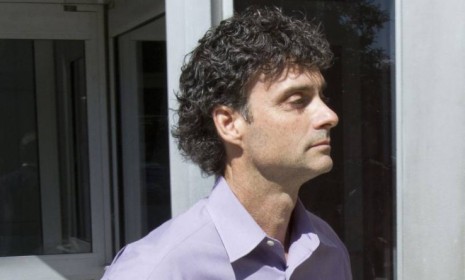The first BP oil spill arrest: An instant guide
Two years after the devastating disaster, the feds arrest a fairly minor player in the major BP oil spill. What's going on?

A free daily email with the biggest news stories of the day – and the best features from TheWeek.com
You are now subscribed
Your newsletter sign-up was successful
Almost exactly two years after BP's Deepwater Horizon oil-drilling rig exploded, killing 11 people and eventually sending more than 200 million gallons of oil into the Gulf of Mexico, the Justice Department made its first arrest relating to the disaster on Tuesday. Federal investigators charged former BP engineer Kurt Mix, 50, with two criminal counts of obstructing justice for deleting hundreds of potentially damning text messages. What's the story with this curiously belated arrest? Here, a concise guide:
How was Mix involved in the disaster?
Until he resigned last June, Mix was a drilling engineer at BP. He was part of the several attempts to stanch the flow of oil as well as internal efforts to determine how much oil was gushing into the Gulf. According to prosecutors, Mix erased more than 200 text messages with his supervisor sent in October 2010, upon learning that BP's lawyers were requiring that all electronic communications related to the spill be kept and sent to directly to them; Mix deleted some 100 more in August 2011. Mix's lawyer, Joan McPhee, says the information in the texts was duplicated in emails and other documents Mix did preserve, making the "misguided" case an example of "startling government overreach."
The Week
Escape your echo chamber. Get the facts behind the news, plus analysis from multiple perspectives.

Sign up for The Week's Free Newsletters
From our morning news briefing to a weekly Good News Newsletter, get the best of The Week delivered directly to your inbox.
From our morning news briefing to a weekly Good News Newsletter, get the best of The Week delivered directly to your inbox.
What was in the deleted text messages?
The government says the erased messages, some of which were recovered forensically, include "sensitive internal BP information collected in real-time" about BP's failed efforts to seal the well, including the "top kill" operation that pumped heavy drilling mud down the well. In one text sent during the "top kill" attempt, Mix allegedly alerted his supervisor that the well had "too much flowrate — over 15,000 and too large an orifice." BP engineers had already determined that the "top kill" plan wouldn't work if 15,000 or more barrels per day of oil were gushing out, instead of the 5,000 BP was reporting to the public.
Why does that matter?
If the government can prove that BP was willfully withholding information about how much oil was gushing from the well, that could dramatically increase the fines the oil giant will have to pay for violating the Clean Water Act. But lying about the flow rate "obstructed more than justice," Harvard Law professor Richard Lazarus tells The New York Times. "It may have impeded the effort to contain the flow and allowed it to continue longer than it did, increasing the damage."
A free daily email with the biggest news stories of the day – and the best features from TheWeek.com
Will there be more arrests?
Yes, many more, says Paul M. Barrett at Bloomberg Businessweek. Deleted texts "may seem like small potatoes for the mighty U.S. Department of Justice," but the arrest suggests that "prosecutors are focusing on whether BP tried to cover up the size of the spill in an attempt to trim billions of dollars from its ultimate criminal environmental-law fine." In nabbing a relatively small fish like Mix, the feds are "trying to use what they have against some people as leverage to implicate higher-ranking people," says Harvard's Lazarus, who also worked on President Obama's BP oil-spill panel.
What kind of punishment could Mix face?
If convicted on both counts of obstruction of justice, he's looking at up to 20 years in prison and as much as $500,000 in fines. If Mix knows where the proverbial bodies are buried, and cooperates with the government, though, he'll get off much easier, says Businessweek's Barrett. In white collar cases, federal prosecutors typically "lean on small players in hopes that they will plead guilty in exchange for a more lenient sentence, and point a finger at people further up the corporate ladder." That's why Mix "drew the short straw and the very first criminal charges."
Why did it take two years to charge him?
Most likely because the federal Deepwater Horizon Task Force involves a handful of federal agencies, and these cases take a while to put together. But BP is also in the midst of settling several large civil suits, including one with the federal government, Natural Resources Defense Council attorney David Pettit tells the Los Angeles Times. BP is trying to lowball the spill figures, and the criminal charges can't hurt the feds' bargaining position. "If they can lead BP to think that Justice is starting to go up the chain, and that there will be more of these arrests, that might incentivize BP to up their offer a bit."
Sources: Bloomberg Businessweek, Justice Department, Los Angeles Times, New York Times, NPR, Reuters, Slate, USA Today
-
 The Olympic timekeepers keeping the Games on track
The Olympic timekeepers keeping the Games on trackUnder the Radar Swiss watchmaking giant Omega has been at the finish line of every Olympic Games for nearly 100 years
-
 Will increasing tensions with Iran boil over into war?
Will increasing tensions with Iran boil over into war?Today’s Big Question President Donald Trump has recently been threatening the country
-
 Corruption: The spy sheikh and the president
Corruption: The spy sheikh and the presidentFeature Trump is at the center of another scandal